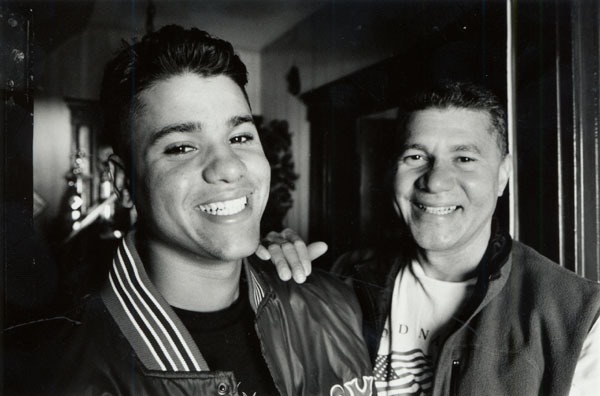
She Knows the Score
Written by Ellen Mills | Posted by: Anonymous
The morning after the Boston Red Sox’s heartbreaking loss to the New York Yankees in the last game of the American League Championship Series, there is sadness in Patricia Alvarado’s voice as she speaks of the team, the season and what might have been. As the producer of two films about the Red Sox, including "El Tiante: A Red Sox Story" and "Getting to Fenway," she understands the weight of history for this team and the magnitude of the loss.
A native of the Republic of Panama, Alvarado grew up watching baseball with her father. The family always followed the World Series, especially if any players from Panama or other Latin countries were involved.
"I remember watching Luis Tiant," she says, referring to the great Red Sox pitcher and hero of the 1975 World Series. "I thought that one day I would be a pitcher — you know, that’s how you think when you are 8 or 9 years old. But then I found gymnastics and I forgot about playing baseball."
Alvarado laid all of her sports career aspirations aside as she grew and studied communications at the University of Panama. She worked in television, producing documentaries, children’s programs and a music series. During this time, her sister moved to Boston and would send her tapes from the public television station there (WGBH-TV). Alvarado was impressed by their programming and knew that she wanted to work there one day.
Eventually she did move to Boston, learned English and enrolled in a Master’s Degree program at Emerson College. She earned her degree in 1994 and got an entry level job at WGBH working on a program called "La Plaza," a long running series that highlights the stories of American Latinos. Although Alvarado had attained her goal of working for WGBH, she viewed her position as an administrative assistant as a stepping-stone to becoming a producer once again.
Her father was not pleased that she had taken the job. "He said to me, ‘but you are a producer!’ and I said, I know, but I am going to be patient." She was patient and hard working and eventually got the opportunity to produce again. After 9 years at "La Plaza," she has a list of producing credits including the two baseball shows as well as a list of awards.
The first baseball story that Alvarado produced was "Getting to Fenway," the story of Manny Delcarman, a promising high school pitcher from Boston who becomes a hot draft prospect for the Red Sox.
"I found this story reading the newspaper," says Alvarado. "It appealed to me because it is a double layered story about a father who couldn’t make it [in professional baseball] and a son who is trying to fulfill the dream."
The father is Kuki Delcarman a Dominican who spent five years traveling around the US as a member of the Philadelphia Phillies farm team. With each passing year his hopes of playing for a major league team faded a little more. It was a difficult life and despite Delcarman’s talent he never got the chance to move up to the majors. Finally, he gave up baseball completely to become a mechanic and raise his family. Now, his son has an opportunity to join the Red Sox Minor League organization if the team and his family can agree on the amount of his signing bonus.
The film offers viewers the chance to see "the story behind the story" as the deliberations between the Delcarman’s and the Red Sox over the signing bonus continue right up to the deadline. Kuki’s Delcarman’s experience has made him reluctant to accept the first offer from the team because he knows that if they have more invested in his son they will invest more in his success.
Alvarado spent so much time around the family that they became accustomed to having her and the camera crew in the house. This familiarity allowed for the capture of personal conversations but it also threatened to dispel the distance between the producer and the subject. At one point during the filming of a family discussion about Mannys’ situation, the phone rings and viewers watch Delcarman reiterate his position in the negotiation. Moments before, he had turned to Alvarado and asked for her opinion on camera. "All of a sudden I became part of the conversation," she says. "I had to get out of there — I went to the kitchen and the call came. That wasn’t planned, but it was magical."
"Getting to Fenway" went on to win a New England Emmy for a Sports Special. The other nominees included programs produced by ESPN and other networks that regularly carry sports programming. "When we got the Emmy I was so pleased, and I was on the sports page!" laughs Alvarado. "To me it was awesome."
Alvarado was not finished with Fenway Park or "the Olde Towne team." The producers at "La Plaza" had hoped to tell the story of the great pitcher Luis Tiant known by his nickname, "El Tiante," but he had moved away from Boston and the show limits itself to stories with a local focus. Tiant, a Cuban, was a star pitcher for the Red Sox in the 1975 World Series. As a person of color he became a figure of unity during that time when Boston was fractured along racial lines by the issue of court-ordered busing. His personal story is a poignant tale of a family separated by the politics of the Cold War, the ravages of racism and the pressure and demands of being a professional athlete.
Tiant’s father had been one of the greatest pitchers in Cuban baseball history. As a black man coming to America at the time, Tiant, Sr. could only pitch in the U.S. Negro Leagues where he amassed a stellar record but became disillusioned by the racist barriers holding him back. He returned to Cuba at the age of 42 and earned a living driving a truck. Like the Delcarman family, the dream of a major league career transferred from father to son. Tiant, Jr. left Cuba for his career and then was not able to return to see his parents after the Fidel Castro rose to power.
One day Alvarado received a call from a friend of Tiant’s telling her that the retired pitcher had moved back to Boston. Alvarado talked to Tiant and told him how she would like to tell his story and he agreed to meet her. In his playing days, Tiant was well known in the city for his unique pitching style, his smile, his cigar and his "fu-Manchu" moustache. When Alvarado met Tiant her impression was quite different. "He is, in reality, a quiet person. He doesn’t like to be the center [of attention]. I saw a very serious man staring at me. We began to talk and he smiled at me and I said ‘ah, there’s Luis Tiant.’"
Tiant and his family were very open to help and gave Alvarado interviews and photos for the film. The Red Sox organization gave Alvarado a lot of access filming at Fenway Park, sometimes at odd hours or off season, but would not allow any filming in the locker room. The biggest challenge was tracking down Tiant’s former teammates for interviews. Most of all, Alvarado wanted to interview Carl Yastrzemski, the great Red Sox player who was Tiant’s teammate and good friend.
"Some journalists I know said that I would never get him, that he does not give one-on-one interviews," says Alvarado. "I got his agent’s number and I thought, let me just see." She spoke to the agent and explained what she wanted and why, but the agent was skeptical too, thinking that Yastremski would not agree to the interview.
"I hung up the phone and five minutes later the agent called back to say that Yastremski said yes." Alvarado was thrilled and asked only that the interview not be scheduled for the following weekend when she would be in New Mexico. No such luck. Yastrzemski was available for a short interview only on Sunday at 6 a.m. Undaunted, Alvarado arranged for a good friend and fellow producer to conduct the interview while she supervised via cell phone from New Mexico. She laughs remembering her friend dutifully describing all the lighting and set details to her over the phone and then relaying her questions to Yastrzemski. The unorthodox set-up worked, and Alvarado got the interview she needed.
"All the elements came together for this story," Alvarado says. "I wanted to portray him [Tiant] as he was and that moment in history the way it was." As pleased as she is with the finished film, she admits that she was nervous to have Tiant see it for the first time at a screening at the Harvard Film Archive.
"Three hundred [people] came that night. I reserved the first row for him and he sat in the last row. The entire family was crying at the end of the film. He gave me a big hug and that meant a lot to me," she remembers.
When asked if people are surprised that a woman made these films about fathers and sons and baseball, Alvarado is unsure. She does say that both Kuki Delcarman and Luis Tiant were surprised when she approached them about filming their stories, but it was because she seemed "too young and not connected to baseball," she says. Both men were "very respectful" and understood that she wanted to tell their stories in a way that would appeal to baseball fans and general audiences alike. "I put my heart in these stories," she says simply.
Good fortune followed Alvarado while she was making her films about the Red Sox, even if it eludes the team itself sometimes. The team’s quest for a World Championship will continue, and along the way there will be stories to tell. Patricia Alvarado found two good stories, made memorable films and along the way "became a passionate fan." She will be watching as a fan and perhaps as a producer she will find another irresistible story in the fabled field called Fenway Park.
'El Tiante: A Red Sox Story' and 'Getting to Fenway' will be shown November 12 as part of the 'Chicks Make Flicks' film series sponsored by Women in Film and Video/New England. For more information: www.wifvne.com or call (617) 612-0091. For more information about La Plaza and Patricia Alvarado: www.laplazatv.com.












